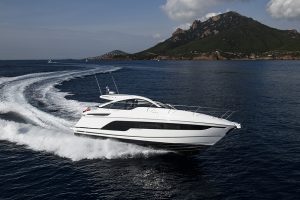Britain Afloat: New BBC documentary on boats starts Saturday 30 September
Boaters rejoice! Britain Afloat, a new six part documentary that explores how boats have shaped Britain, starts on BBC Two at the end of September
Britain Afloat, the BBC Two documentary coming to our screens on Saturday 30 September looks at how the waterways of Britain and boats have shaped the country.
Presented by broadcaster and journalist Mary-Ann Ochota the programme looks at the waterways of Britain, discovering how boats have shaped our lives.
The six part series that explores the regional distinctiveness of boat design and the floating way of life, from the modest coracle – whose shape was adapted to suit individual rivers across Britain – to the boats that helped London flourish: Thames sailing barges.
Each episode explores different boat designs and evolution, looking at the impact craft had on the people and communities, both in days gone by, and today. Although many of the boats in question are no longer used for their original purposes, the series shows why they are still such an important part of the British heritage.
Mary-Ann Ochota will meet with the boating community, boat builders and with olympic rowers Anna Watkins and Sir Steve Redgrave.
The six part series will feature:
The Thames Sailing Barge

Mary -Ann discovers the boat that helped build Victorian London and played an important part at Dunkirk. There are still about 30 of these boats on the water – once there were more than 2000 – though nowadays the emphasis is very much on pleasure, something Mary-Ann experiences for herself when she joins the annual Thames Barge match.
The Coracle

Mary-Ann finds out about the coracle, an ancient paddle propelled boat mainly – but not only – used in Wales – that can be made from twigs and a bed sheet. Ochota also learns how to make her very own, which she uses to race in the annual Ironbridge Coracle Regatta, an event that proves there is still an enduring popularity to these little boats, even if the focus is now very much on fun.
The Narrow Boat

This episode explores the story of the working narrowboat discovering how this boat helped power our great Industrial Revolution and shaped the lives of those who earned their living from the canals.
Continues below…
Watch: Donald Crowhurst biopic The Mercy trailer
New stills from the much awaited film, The Mercy, which stars Colin Firth and Rachel Weisz as Donald and Clare…
Top 10 Sailing and boating TV programmes
Howards' Way, The Onedin Line and The River...YBW brings you the pick of sailing and boating TV programmes over the…
Top 10 best boat-themed films of the 1980s
In no particular order, we've pulled together some of the best sailing and boat-themed films of the 1980s. Vote, and…
The Punt

From a Bronze Age craft dug up in the mud of East Anglia to the extraordinary gun punt, Mary-Ann discovers how these boats allowed people to hunt, fish and trade. Archive film tells the story of their transformation into an Edwardian leisure craze that still endures today.
The Mersey Sailing Boats

This episode discovers how the Mersey, famous for its port, also played a vital part in the development of pleasure sailing. What began with fishermen racing each other, led to the formation of numerous sailing clubs, all with their own particular design of boat.
The Rowing Eight

Mary-Ann discovers how the Rowing Eight – the fastest rowing boat in the world – can trace its origins to Thames river taxis from the 1600s. From its working class origins the boat has become the centerpiece of regattas all over the world. Yet despite its origins – entertainment for river workers – the Rowing Eight found itself at the centre of a class war that ended up in Parliament.
Series producer, Ed Barlow comments: “Britain Afloat is a series that really embodies ‘great’ British tradition, enterprise and ingenuity, and shows how some of our most well-known boats have developed throughout the centuries – often in ways their original designers and users could never have anticipated.
“It’s not just about the boats though – Britain Afloat is as much about the people and communities that have used them, both in centuries gone by and today, and around the country Mary-Ann meets the dedicated and passionate enthusiasts who are maintaining traditions and preserving old boats, ensuring that they stay on the water for years to come.”
Britain Afloat starts on Saturday 30 September on BBC Two at 8pm.











